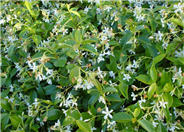
Common name:Maidenhair Tree, Ginkgo Tree
Botanical name:Ginkgo biloba
The Ginkgo biloba, with its distinct fan-shaped leaves, initially grows with a pyramidal habit, but later becomes wide-spreading. It is generally not bothered by insects or disease. It slowly reaches 35'-50' tall and wide. It needs regular watering and more during hot summer months. Flowers are inconspicuous. Fall color is spectacular with changing color of leaves from light green with a yellow tinge to yellow.

Common name:Freeway Daisy, Trailing African Dai
Botanical name:Osteospermum fruticosum
This groundcover-small shrub will grow 1' tall, spreading 4' in a year. It has medium-size green leaves with lavender that have a dark purple center. The flower color changes to white the next day! The flowers bloom in fall and winter but in mild coastal areas, may bloom all year. It needs well draining soil. This plant looks great on a hillside or in a hanging basket.

Common name:Blue Fescue, Blue Fescue Grass
Botanical name:Festuca glauca
This ground cover/grass will grow less than 1' tall and has small, blue-green, evergreen leaves that are very thin and hair-like. Flowers appear in the summer but are insignificant. This dependable ground cover prefers full sun in coastal areas and afternoon shade in warm inland areas. It needs well draining soil and is drought tolerant once it's established. Leaves may burn during the summer but trim in winter to keep it looking refreshed.

Common name:Star Jasmine, Maile Haole
Botanical name:Trachelospermum jasminoides
Star Jasmine is an evergreen vine that grows 20' tall or a ground cover that reaches 1'-2' tall and 4'-5' wide. It has white fragrant flowers in the summer and can tolerate sun or partial shade. The star jasmine needs regular watering. Leaves are dark green, oval, thick, about 2" long. This is a great plant on a trellis, in containers or in a parking strip.
| Designer: | Mauve Wall and Garden |
Photographer: GardenSoft |
Soils and Compost:
Incorporate compost 6" into your soil to retain water, reduce compaction, feed earthworms, and provide valuable nutrients to your plants.
Water Saving Tip:
Fix leaking sprinklers, valves, and pipes.
One broken spray sprinkler can waste 10 gallons per minute - or 100 gallons in a typical 10 minute watering cycle.
Integrated Pest Management:
Drip and other smart irrigation delivers water directly to roots, allowing no excess water for weeds.
